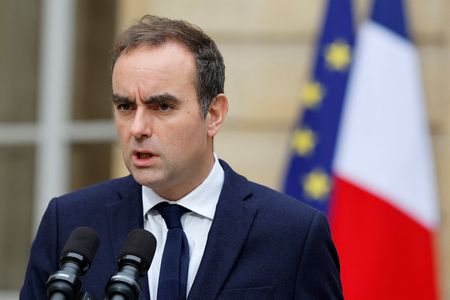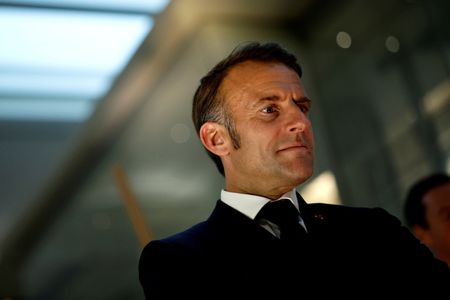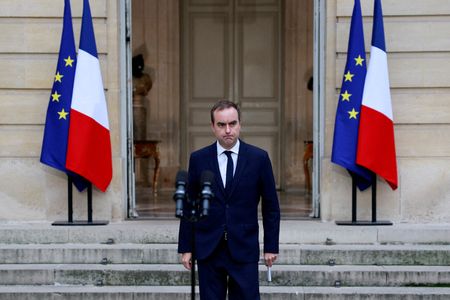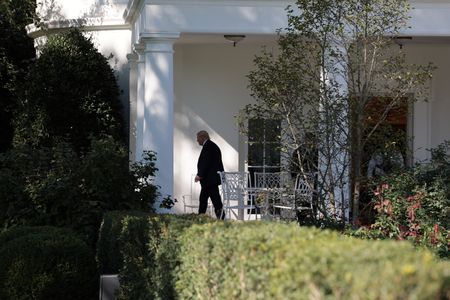By Elizabeth Pineau
PARIS (Reuters) -French President Emmanuel Macron reappointed Sebastien Lecornu as prime minister on Friday just days after he quit the job, a move that enraged some of the president’s fiercest political opponents who pledged to vote out the new government.
Macron, 47, will hope loyalist Lecornu can draw enough support from a deeply divided parliament to pass a 2026 budget. Faced with France’s worst political crisis in decades, many of Macron’s rivals have demanded he either call fresh parliamentary elections or resign.
The immediate reaction to Lecornu’s appointment from the far right and hard left was scathing, suggesting his second stint as prime minister will be no easier than his first, which ended on Monday when he resigned after just 27 days in office.
“The Lecornu II government, appointed by Emmanuel Macron who is more isolated and out of touch than ever at the Elysee Palace, is a bad joke, a democratic disgrace and a humiliation for the French people,” National Rally party president Jordan Bardella posted on X.
LECORNU’S PRIORITY IS TO PASS A BUDGET FOR 2026
There was no immediate reaction from the leadership of the Socialists and the conservative Republicans, both of whom will be crucial to Lecornu’s survival.
Lecornu’s most pressing task will be to deliver a budget to parliament by the end of Monday.
“I accept – out of duty – the mission entrusted to me by the President of the Republic to do everything possible to provide France with a budget by the end of the year and to address the daily life issues of our fellow citizens,” he wrote on X.
“We must put an end to this political crisis that exasperates the French people and to this instability that is harmful to France’s image and its interests.”
Lecornu added that whoever joined his government would have to renounce their personal ambitions to succeed Macron in 2027, a contest that has injected instability into France’s weak minority governments and fractious legislature. He pledged his cabinet would “embody renewal and diversity.”
Macron’s entourage said Lecornu had “carte blanche”, in a sign the president was leaving his prime minister plenty of wiggle room to negotiate a cabinet and budget.
LEFTIST PARTIES UPSET WITH MACRON
Macron earlier convened a meeting of mainstream party leaders to rally support around his choice, but angered leftist parties when they found out one of their own would not be named as prime minister.
Another collapsed government would raise the likelihood of Macron calling a snap election, a scenario seen benefiting the far right the most.
France’s political turmoil, which has dented growth and spooked financial markets, was in large part triggered by Macron’s decision last year to hold a legislative election, a gamble that delivered a hung parliament split between three ideologically opposed blocs.
The country’s push to get its finances in order, requiring budget cuts or tax hikes that no party can agree on, has only deepened the malaise.
If the National Assembly cannot find common ground on a budget in the time given, emergency legislation may be needed to keep the country running next year on a roll-over budget.
FATE OF PENSION REFORM IS KEY ISSUE
The country’s central bank chief, Francois Villeroy de Galhau, forecast on Friday that the current political uncertainty would cost the economy 0.2 percentage points of gross domestic product. Business sentiment was suffering but the economy was broadly fine, he said.
“Uncertainty is … the number one enemy of growth,” Villeroy told RTL radio.
Fraught budget negotiations have cost Macron three prime ministers in less than 12 months.
Central to the most recent budget negotiations have been the left’s desire to repeal Macron’s 2023 pension reforms that lifted the retirement age, and tax the wealthy more heavily. Those demands have been hard to square with the conservatives, whose support Macron also needs to pass a budget.
In Friday’s meeting, Macron offered to delay raising the retirement age as far as 64 by one year to 2028. Green leader Marine Tondelier described the concession as insufficient.
The deficit is forecast to hit 5.4% this year, nearly double the European Union’s cap. Lecornu recently said he envisaged a 2026 deficit between 4.7% – 5%.
(Reporting by Paris NewsroomWriting by Gabriel Stargardter and Richard LoughEditing by Alison Williams, Frances Kerry and Toby Chopra)











